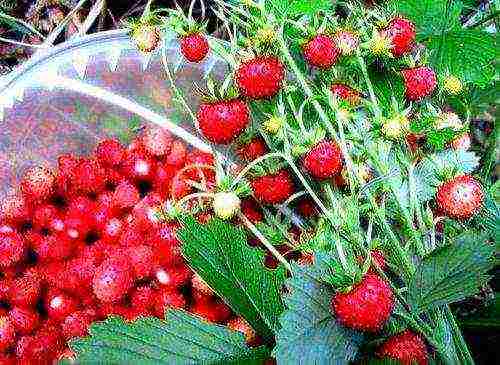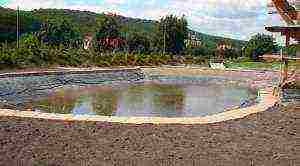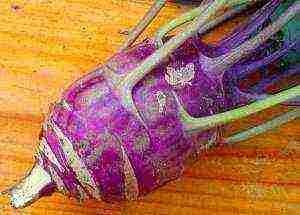Content
- 1 Who is the tomato good with?
- 2 Each vegetable has its own "apartment"
- 3 Useful video
- 4 Basic Rules
- 5 Choosing a variety
- 6 Recommended varieties
- 7 Recommendations
- 8 Where can strawberries be grown?
- 9 Growing strawberries as a business
- 10 How to grow strawberry seedlings
- 11 The technology of horizontal cultivation of strawberries in plastic bags
- 12 Technology for vertical cultivation of strawberries in bags
Who is the tomato good with?
 A vegetable is like a person. In good company and he feels good. But how to determine what is suitable for a tomato in a closed limited area. What can be planted and grown in a greenhouse with tomatoes?
A vegetable is like a person. In good company and he feels good. But how to determine what is suitable for a tomato in a closed limited area. What can be planted and grown in a greenhouse with tomatoes?
He - pretty moody culture and is not easy to clean. In the greenhouse, he will always be the owner... Therefore, cultures for the neighborhood with him should be selected similar in terms of growing conditions.
Cucumbers
Consider two of the most popular greenhouse crops - tomatoes and cucumbers. They don't belong in one greenhouse, only as a last resort and under certain conditions. The difference is in the conditions they need:
| Culture | Watering | Airing | Fertilizer | Temperature |
| Tomato | watering only at the root | Yes | necessarily | moderate |
| Cucumbers | watering and sprinkling | No | not required, except organic | thermophilic |
If possible, it is better to take cucumbers outdoors on a manured bed under a film, they will perfectly take root there and give a crop. Tomatoes are best left in the greenhouse..
Peppers
Another greenhouse crop, especially in Siberia and the northern regions, is sweet pepper. They are with tomato belong to the same species - nightshade. Greenhouse compatible, since the conditions of their cultivation are similar.
But there is one in their living together the problem is the microclimate in the greenhouse... Tomatoes love warm, but dry air, which means that the temperature for them should be high, but at the same time with good air movement. And pepper, on the contrary, loves warmth and moisture to match the cucumbers.
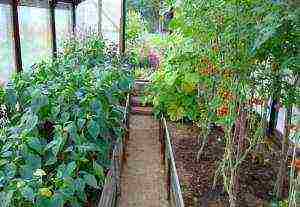 Some gardeners still grow peppers in the same garden with tomatoes.
Some gardeners still grow peppers in the same garden with tomatoes.
At the same time, a "chess" scheme is practiced, which provides sufficient access to light for both cultures.
Peppers benefit from the presence of tomatoes in the neighborhood... The substances contained in them repel aphids, which are very fond of peppers.
Cabbage and salads
They get along well with early varieties of white cabbage, Peking cabbage, which in general used for compacting tomatoesplanting it at their feet. Wonderful tomato will get along with leafy salads.
Radish, onion and garlic
This neighborhood will benefit all cultures.... Onions with tomatoes are planted only those that are grown for greens. With such a neighborhood you need to provide enough light radishes, onions and garlic.
Garlic - a tomato's helper in the fight against late blight... Its curly arrows need to be collected and made from them an infusion for spraying tomatoes for preventive purposes.
Strawberry
Strawberries (strawberries) coexist well with tomatoes in the same room (greenhouse). Both cultures do not like high humidity, they requires constant ventilation in order to avoid infection with fungal diseases. Besides, the draft contributes to the pollination of both crops.
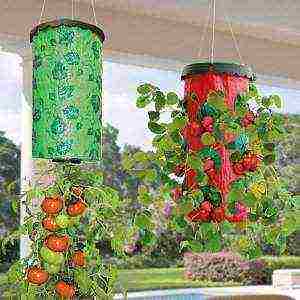 Strawberry bushes alternate with planting tomatoes according to the scheme 60 x 45 cm... Wherein the feeding area of strawberries must be at least 30 x 15 cm on the bush.
Strawberry bushes alternate with planting tomatoes according to the scheme 60 x 45 cm... Wherein the feeding area of strawberries must be at least 30 x 15 cm on the bush.
The best crops to grow together with tomatoes
From what is best to plant in a greenhouse along with tomatoes (tomatoes), you can make a small list:
- legumes (beans, beans);
- watermelons;
- radish;
- Melissa;
- celery;
- parsley;
- basil.
Melissa and Basil Improve Tomato Flavor... The main thing is to observe the light regime for the neighbors. For this, tomato bushes must be tied up.
Incompatible cultures
- Dill;
- kohlrabi;
- fennel.
Vegetables correctly selected for joint cultivation will not only not harm each other, but also will help to increase yields up to 20-25%.
Each vegetable has its own "apartment"
For those who are still trying to grow poorly compatible vegetables in the same greenhouse, there is a way out. This is organization of space... What can you plant tomatoes with in a greenhouse? The most "greenhouse" plants are tomatoes, cucumbers, peppers and eggplants. Their compatibility is poor, so they should be separate from each other.
If the greenhouse has two entrances from opposite sides, it is easier to place cultures in it. With sufficient width, three beds are made. Tomatoes are planted on the middle - this part of the greenhouse is best ventilated. Peppers are placed on the north side, cucumbers or eggplants on the south side. Although it is better to exclude cucumbers.
If there is only one door in the greenhouse, and on the opposite side there is only a window, crops can be arranged in the following order: tomatoes are planted near the doors, they must be separated from the rest of the area either with a film, or with slate or plywood. The best material is film.
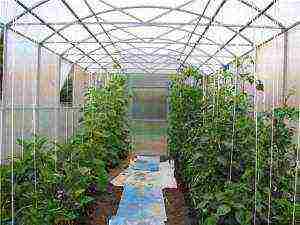 Next, cucumbers are planted, followed by eggplants - both vegetables are very thermophilic and they will be fine in the middle. And last but not least, peppers are planted by the window, they prefer a cooler atmosphere.
Next, cucumbers are planted, followed by eggplants - both vegetables are very thermophilic and they will be fine in the middle. And last but not least, peppers are planted by the window, they prefer a cooler atmosphere.
Placing not very compatible crops in the same greenhouse you need to be prepared for a slight decrease in yield each of the cultures.
Today, greenhouse manufacturers offer various designs, in particular, indoor ones. With the help of partitions-modules, you can create separate rooms with the desired microclimate in them, which will allow you to combine the "incompatible" in one greenhouse and not think about what to plant tomatoes with.
Useful video
For more information about what you can plant tomatoes in a greenhouse with and how to equip a greenhouse in order to make the most of the space and grow incompatible vegetables in it, you can watch the video:
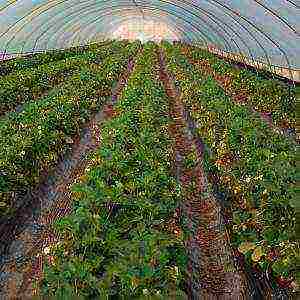
Growing strawberries in a greenhouse allows you to get record yields of berries per unit area, while it is not so easy to create optimal conditions for this crop of hydrothermal regime in protected ground conditions. About which varieties of strawberries are best suited for greenhouse cultivation, as well as the recommended planting patterns, are described in detail here, and now let's look at other features of growing this type of berries in a greenhouse.
You can grow strawberries in a greenhouse in different ways, but it is most rational to combine planting with other crops. The scheme described below deserves the greatest interest, in my opinion (all terms are given for central Russia).
In the first season, tulips are planted as predecessors of strawberries in the greenhouse (September 15 of the previous year, according to the 15 x 7 centimeters scheme), or green vegetables (April 10-15). Please note that these crops must be harvested before June 20, when strawberry seedlings are planted in their place. The soil is dug up, leveled and slightly raised beds with a width of no more than 90 centimeters are formed. Their surface is mulched with a black non-woven covering material or with an opaque film. This agricultural practice removes the need to loosen row spacings, minimizes watering and weed control, and the plants develop more vigorously and their overall productivity increases.In addition, the berries lying on the mulch are less susceptible to rotting and spoilage.
Strawberry seedlings from varietal and healthy mother plants are planted in cross-shaped cuts in the mulch according to the 7 x 7 centimeters scheme on the 20th of June. After about a month, thinning must be done by removing the bushes after one with a final arrangement of 15 x 15 centimeters. When digging up excess plants, you should also free up the space allocated for planting tomatoes, which will be grown with strawberries next year according to a 60 x 45 centimeters scheme. It is advisable to mark the nests for tomatoes with pegs and make them permanent (the soil in these places is disinfected by steaming every 3-4 years). It is possible to plant kohlrabi seedlings in the places vacated for tomatoes from the beginning of August in order to have time to harvest them until October 15, when a serious cold snap sets in in most regions of our country.
In the second year of growing strawberries in a greenhouse, tomato seedlings dive into designated holes in the second or third decade of May. After the first wave of the harvest, it is recommended to thin out the strawberries through the row, so that by the time of the next fruiting, the plants remaining in the garden bed are provided with a nutritional area of 30 x 15 centimeters.
 Tomatoes are dug up and removed from the greenhouse in mid-September. In the holes freed from plants, onions are planted, intended for forcing green feathers next spring. Tulip bulbs can also be planted in place of the removed strawberries (according to the 30 × 7 centimeters pattern).
Tomatoes are dug up and removed from the greenhouse in mid-September. In the holes freed from plants, onions are planted, intended for forcing green feathers next spring. Tulip bulbs can also be planted in place of the removed strawberries (according to the 30 × 7 centimeters pattern).
In the third year after the harvest of the bulbous feather, the bulbs are removed from the soil in mid-May and tomato seedlings are again placed in their place. In mid-June, they dig out their spent strawberries from the garden bed and remove the tulip bulbs, and the tomato plants are allowed to develop freely until mid-September. After the growing season of tomato bushes is completed, the entire area of the greenhouse can be occupied with green crops (watercress, lettuce, spinach, radishes and others according to the 7 x 7 centimeters scheme), or the same tulips (placed according to the 15 × 7 centimeters scheme).
Otherwise, care for strawberries grown in greenhouse conditions is quite standard: watering, loosening (if there is no mulch), weed and pest control. During the flowering period, it is advisable to reduce the frequency of watering, which will help dry the pollen grains and their better volatility. At the same time, it is advisable to feed the plants with potassium magnesium. And for the prevention of diseases caused by increased dampness in the greenhouse, it is recommended in the spring, even before the flowers bloom, to spray the plantings with fungicides 2-3 times. In addition, it is advisable to treat the plants with some kind of immunostimulant that will improve their resistance to unfavorable external factors.
Are you a resident of the northern Russian regions or central Russia with not very warm summers? You can get a guaranteed harvest of garden strawberries already in April-June, planting strawberry bushes in a greenhouse, you will provide yourself with fragrant berries for the whole summer. To get a good harvest, you should follow the rules for growing strawberries in a greenhouse.
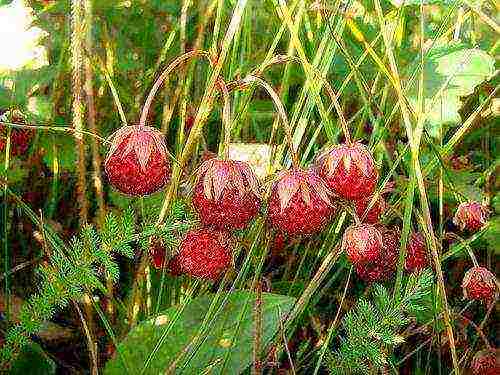
Strawberry
Basic Rules
In advance, you need to prepare the land for strawberries. For about a year, the land is fertilized with peat, humus. Immediately before planting the bushes of garden strawberries, mineral fertilizers (nitrogen, phosphorus, potassium) are applied.
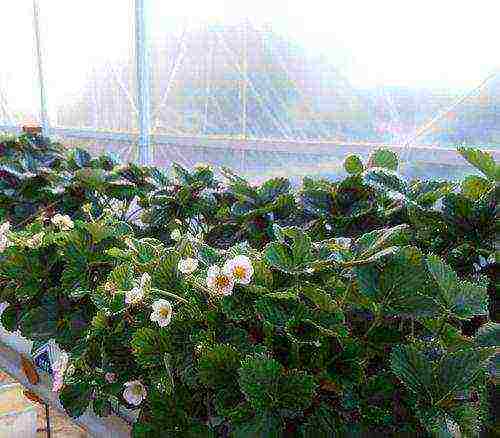
Strawberries in the greenhouse
The composition of the soil for effective fruiting of berries should be as follows:
- garden solid soil - 1 part;
- compost - 1 part;
- wood ash - 0.1 parts.
- peat - 20% of the total volume of soil;
- sawdust (preferably coniferous) - up to 10%.
In the fall, purchase seedlings and plant them in pots. If strawberries are already growing on your site, then at the very beginning of summer, take a few healthy mustaches and, without cutting off from the main bush, plant them in pots with earth. Once the mustache is rooted, you can cut it off from the bush.
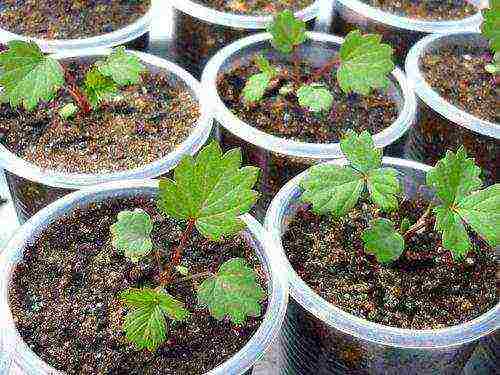
Strawberry seedlings
Leave the pots in a cool, dark place until mid-winter. A little cold stress is necessary for the subsequent fruiting of the bushes. Garden strawberries are first placed in a cold greenhouse (+ 7 ° C), then at the end of winter - early spring, we turn on the heating of the greenhouse, bringing the temperature to + 13 ° C, but no more. If the temperature exceeds + 13 ° C, the bushes will not bloom. With the onset of active flowering and fruiting, the temperature in the greenhouse rises to 20-28 ° C.
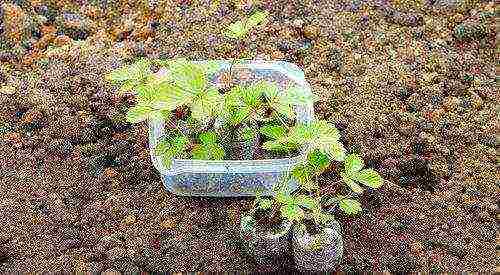
Planting strawberries
If we grow strawberries in a greenhouse, we should be careful with watering, avoid waterlogging the soil. The emerging flowers are subjected to manual pollination. Once a week, the plants are fed with liquid tomato fertilizer.
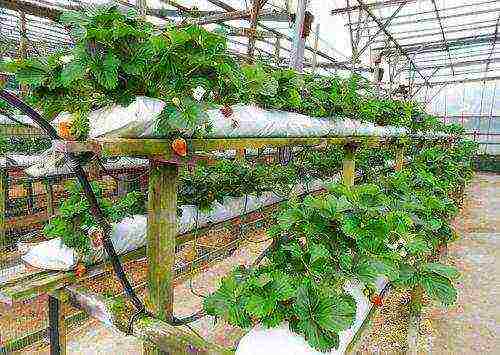
Planting strawberries in tiers in a greenhouse
With constant use, the soil in the greenhouse is quickly depleted. Mineral feeding is carried out approximately once every two weeks:
- Take 10 g of potassium chloride.
- Add 80 g of ammonium nitrate.
- Mix it all up in a bucket of water.
- Apply at the root.
Recipe for organic feeding: manure is diluted with water in a ratio of 1: 5, you can use chicken manure, diluting it in a ratio of 1:10.
The planted berry bushes bear fruit well for 2-3 years, then they must be replaced with younger ones.
The crop can be harvested all year round if you buy different varieties: early ripening, late ripening. Garden strawberries will bear fruit at different times, providing a fragrant berry.
Depending on the purpose for which the berry is grown, its varieties are selected. So that you can eat fragrant berries all year round, it is better to choose remontant varieties that grow well under neutral daylight. Reconstructed or climbing strawberries in a greenhouse produce several harvests per season.
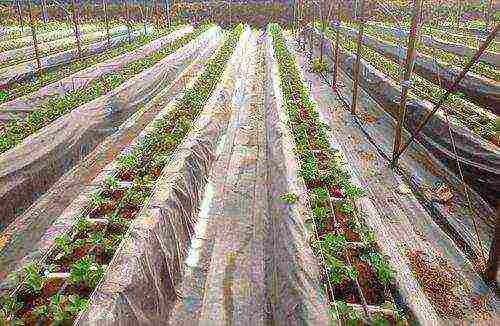
Choosing a variety
Remaining strawberry varieties:
- Source;
- Queen Elizabeth;
- Selva;
- Albion.
These varieties are specially adapted for growing indoors. They are capable of intense fruiting.
Benefits of remontant varieties:
- The berries are tender, sweet, aromatic.
- The repairing variety is frost-resistant.
- Easy to care for.
- Excellent decorative effect.
Growing remontant strawberries in a greenhouse requires some effort. You will have to tinker with her. Proper care, regular replacement of fertile plants with younger ones will provide a fragrant berry all year round. You will not care: summer outside, autumn or winter.
For fruiting all year round, it is necessary to provide for a different planting of planting material in time. It is recommended to have three groups of beds - fruiting, growing and just planted.
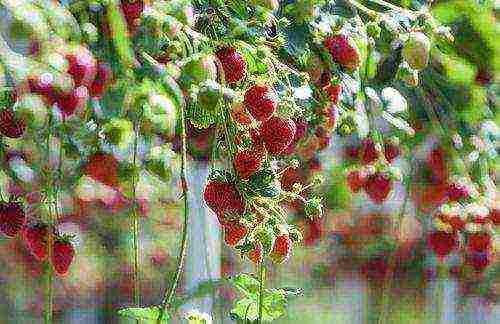
If strawberries are to be grown commercially, varieties are selected that produce firm, transportable, medium to large berries.
Recommended varieties
For cultivation in a greenhouse, it is recommended to purchase varieties:
- Viva Rosa is a late variety.
- Honeoi is an early ripening variety.
- Elvira is an early ripe, very productive variety.
- Elsanta is a mid-season variety with large berries.
Despite the fact that your garden strawberries are grown in a greenhouse, there are risk factors such as:
- aphid;
- botrytis, or gray rot;
- various viruses settling in old greenhouses.
Aphids must be removed immediately. Gray rot is provoked by insufficient ventilation and excess moisture in the soil. Plants with signs of viral infection must be destroyed immediately.
It is important to observe the required distance between rows with berries - approximately 30–40 cm, and the distance between the planted bushes is up to 25 cm. If the plants sit too tightly, they will not have enough light and nutrition.
Recommendations
Some experienced gardeners advise growing tomatoes and strawberries together in a greenhouse. Tomatoes are a rather capricious culture, but they get along well with strawberries.If you have several varieties of strawberries in your greenhouse, so that their whiskers do not mix, tomatoes are planted between them: two plants next to each other, opposite each row. Tomatoes and strawberries get along well together, both plants do not like an excess of moisture in the air and on the soil, they love frequent airing. Their landings alternate according to the scheme of 60x45 centimeters.
Strawberries in a greenhouse in winter are no longer as rare as they used to be.
There is a Russian proverb: "The devil is not so terrible as he is painted." It is not at all a difficult task to grow strawberries in a greenhouse yourself. It is important to follow the necessary rules: choose the right varieties and provide the plants with proper care.
Take a look at the photos and videos, choose the variety you like. Get to know the cultivation technology. With work, care and attention, you can fulfill your dream and have a fragrant and healthy berry on the table all year round. And perhaps a new type of earnings will open up in front of you. Garden strawberries can be grown in the greenhouse all year round, along with tomatoes. With proper care, crops will give a good harvest and material gain.
Modern greenhouse systems allow strawberries to be grown year-round. This berry is in demand in the market, which is why many gardeners and farmers choose it as their main product for income. The consumer is ready to buy strawberries in the form of a fresh product or ready-to-produce desserts. The second option is acceptable for catering establishments.
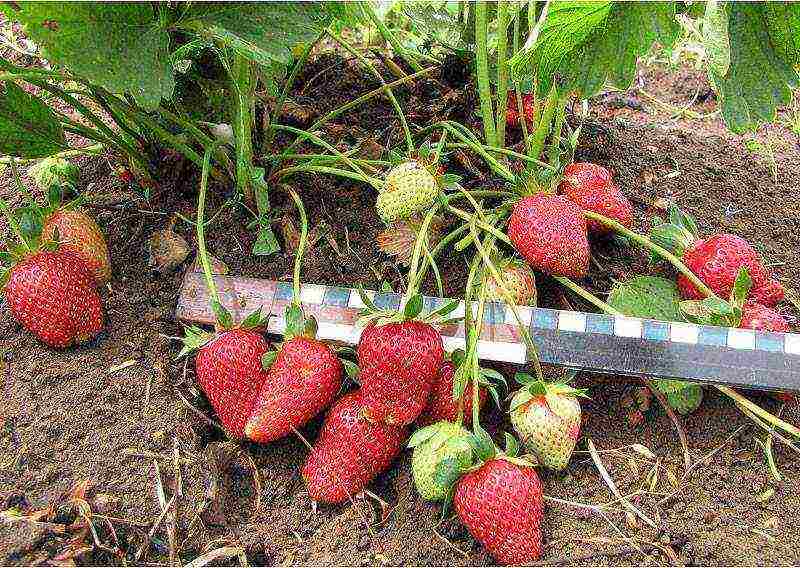
Strawberries in the greenhouse
Where can strawberries be grown?
Strawberries are an unpretentious plant, but still require proper care. This berry can be grown in any room in which the necessary conditions can be created - to maintain the air temperature from + 10 ° C to + 25 ° C (different temperatures are needed at different periods of plant growth) and air humidity within 70-80%.
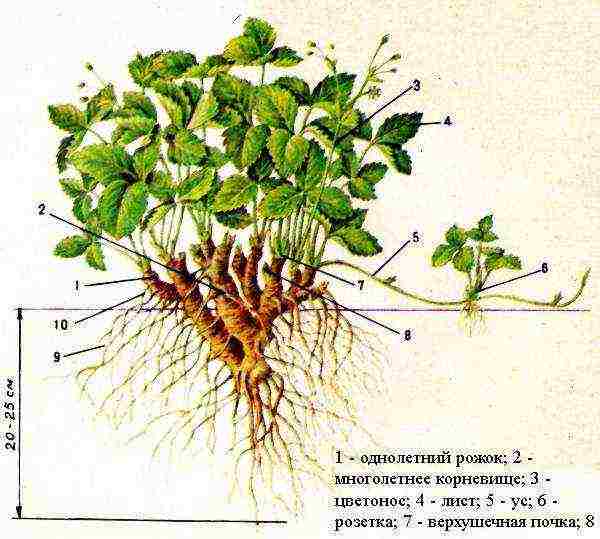
Diagram of the structure of the strawberry bush
Traditionally, strawberries are grown in greenhouses. Thanks to the greenhouse effect, it is easy to provide the most favorable conditions for plant growth and fruit ripening in these rooms. The Dutch technology for growing strawberries in greenhouses has gained great popularity, which involves planting seedlings in plastic bags (and not only).
Many people try to get the harvest of this berry at home, but the optimal solution for a business is still a greenhouse. Successful strawberry cultivation technologies are enough to choose the most suitable one for yourself. The least troublesome method is to use hydroponics. But it is also the most costly, as it requires a much more solid start-up capital than when using plastic bags with soil.
Crop production provides an opportunity for year-round profits. The fact is that the natural sleep period of plants (in winter) can be interrupted by the creation of favorable conditions for their growth and fruiting. It is on this feature of the plant world that all the technologies for year-round cultivation of strawberries in greenhouses are built.
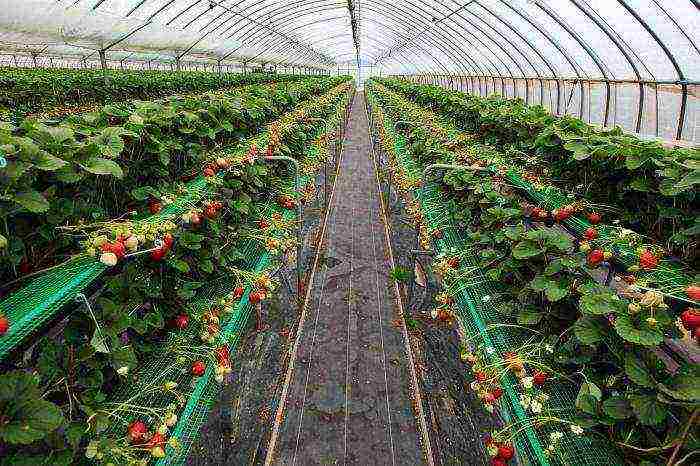
Growing strawberries in a greenhouse all year round
Important! A greenhouse of any size and shape is suitable for harvesting. The type of covering material does not really matter, since all the necessary conditions can be provided with the help of additional lighting and heating.
Growing strawberries as a business
If cultivation of strawberries is chosen as the main direction of a highly profitable business, first of all, it is necessary to resolve the following issues:
- about the method of sales;
- about the possible sales volume for this region;
- on the transportation of the crop;
- storage and storage of crops;
- on the purchase of equipment and materials for arranging a greenhouse.
The minimum area required to start a business is just a few square meters. But it should be understood that in this case, one should not expect high profits.Such a volume of products obtained is more suitable for home use. Any non-residential but heated room, garage or warehouse is suitable for growing berries.
At the preparatory stage, you need to decide on the varieties of the plant.

Some greenhouse strawberries
The following varieties are optimal for the greenhouse business:
- "Sonata";
- "Pineapple";
- "Florin";
- "Will";
- "Kama";
- Elsanta;
- "Producer";
- "Marmolada";
- Truffau.
All these varieties are capable of bearing fruit several times a year.
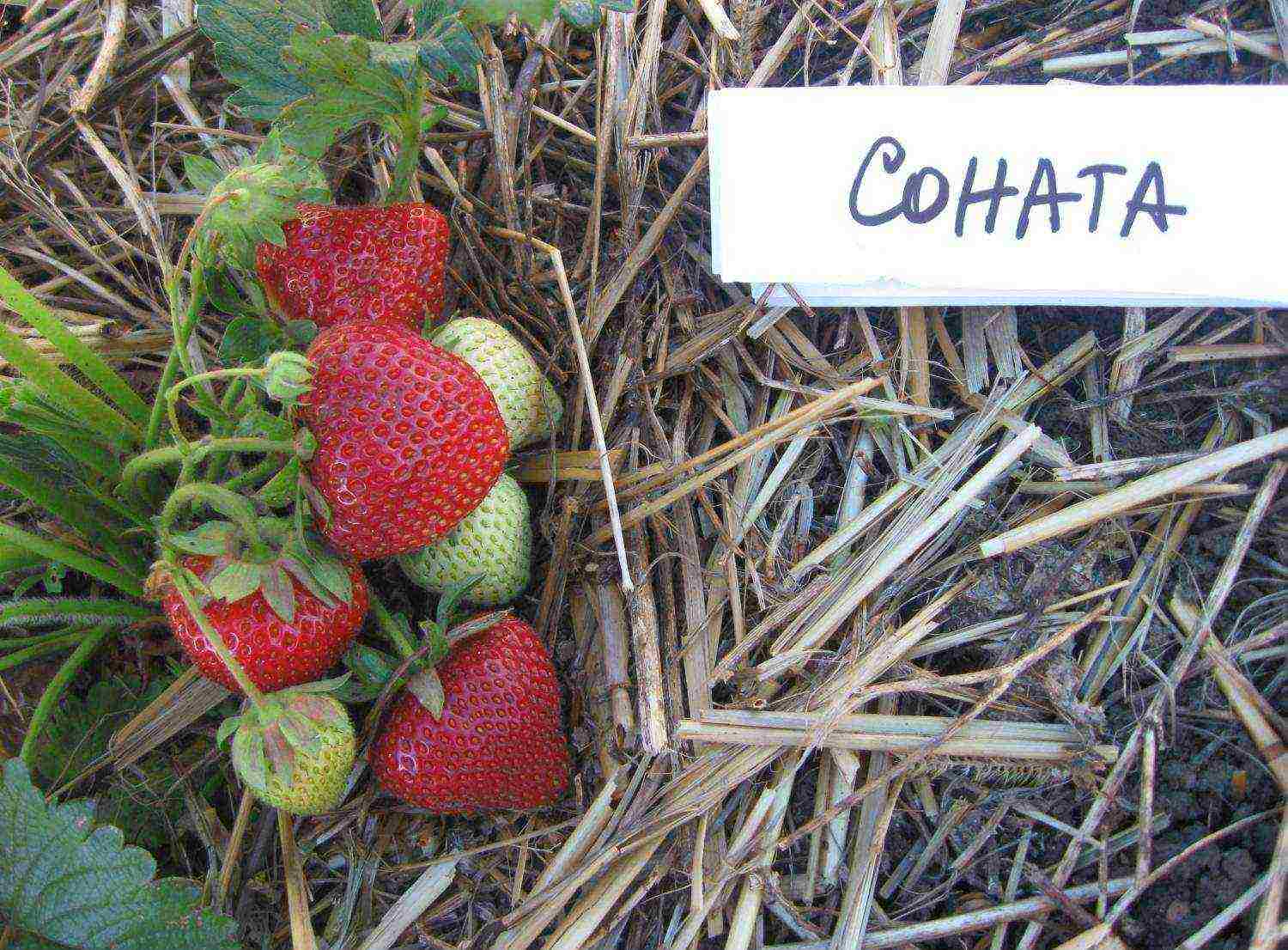
Strawberry "Sonata"

Florin strawberry
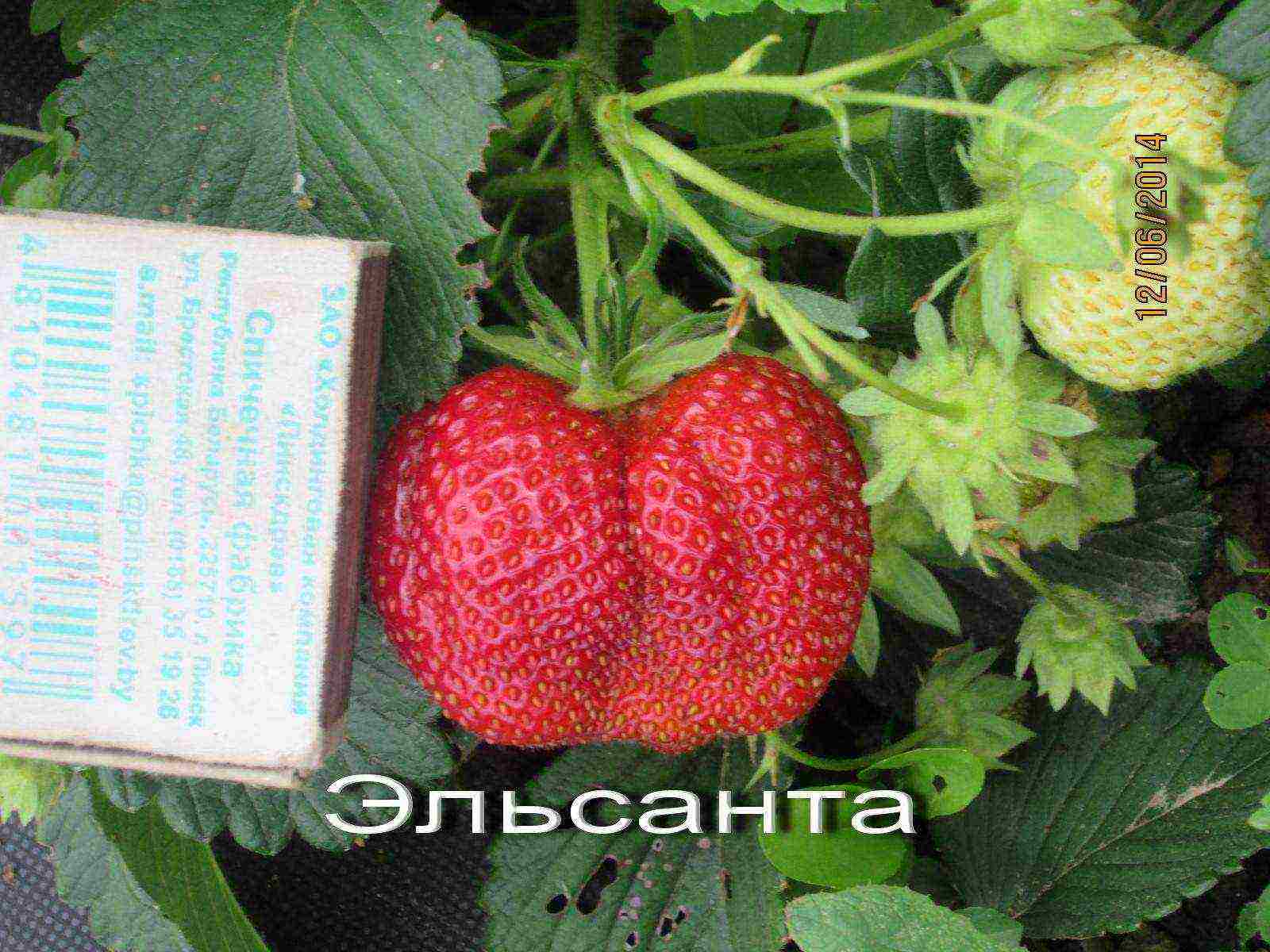
Strawberry "Elsanta"
For greenhouse cultivation, there are three possible planting methods:
- indoors;
- in ceramic or plastic containers;
- in plastic bags.
If hydroponics is being considered, special equipment will be needed.
How to grow strawberry seedlings
Strawberry seedlings can be obtained from seeds or from the whiskers of an adult plant. For growing from seeds, containers with a height of at least 7 cm and soil will be required. You can mix garden soil with sand in a ratio of 1/3 (one part sand and 3 parts soil).
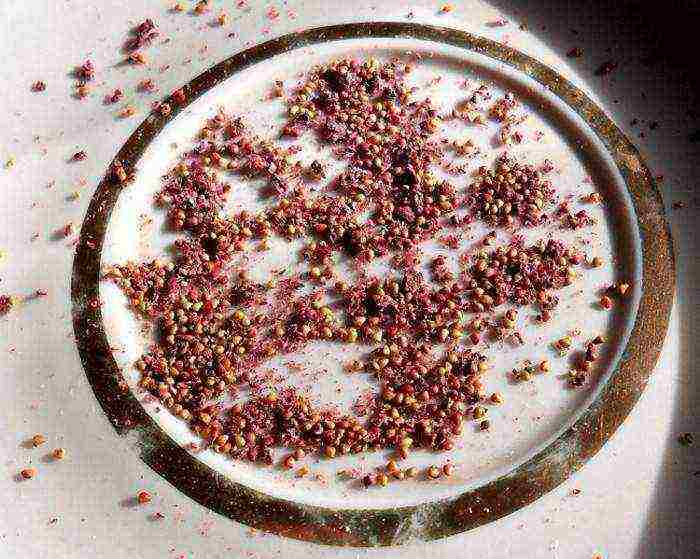
In the photo, strawberry seeds

The seeds are planted in the soil
When growing strawberry seedlings, do not expect quick shoots. They will appear 20-21 days after disembarkation. The fact is that all small-seeded plants develop for a long time. This is due to the small size of the seed, which cannot contain many nutrients. Therefore, you have to be patient.
When the strawberry rises and a second leaf is formed, you need to fertilize with any organic fertilizer. When the seedlings grow up to 8-10 mm, they begin to dive.
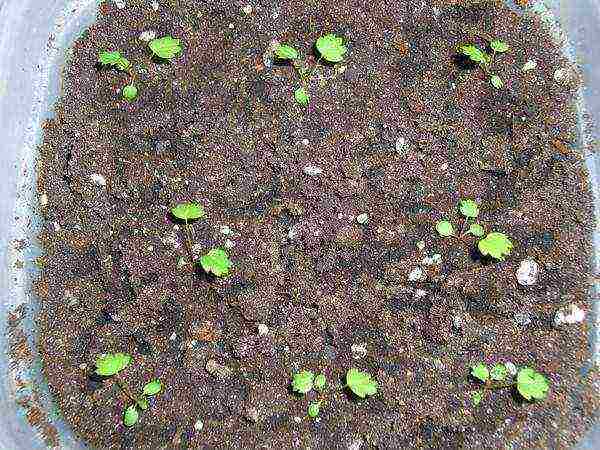
Strawberry seedlings
This will require small plastic cups or any other container of suitable volume. The best choice is plastic glasses with a volume of 0.5 liters. In this case, frequent watering is not required. If you grow seedlings in smaller containers, there will be more trouble in caring for the seedlings.
Seedling picking
The picking procedure consists of several stages, we will consider the features of each of them in more detail.

The main stages of picking strawberry seedlings
Table. The process of diving seedlings - instruction.
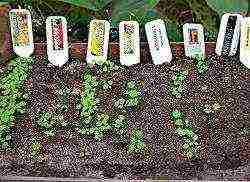 Step 1 |
Water the soil with water at room temperature. |
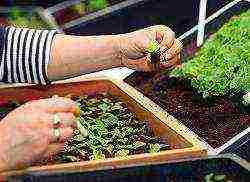 Step 2 |
With the handle of any cutlery (spoon or fork), carefully separate and remove the plant. |
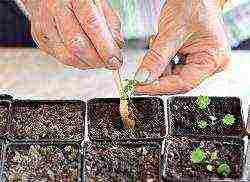 Step 3 |
A small depression is made in a glass with soil (1.5-2 cm is enough). |
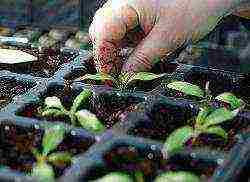 Step 4 |
Plant the plant in a glass / pot. |
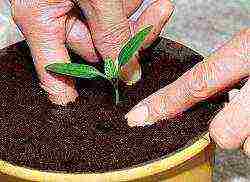 Step 5 |
A low bed of soil is formed around the base of the stem (instilled). |
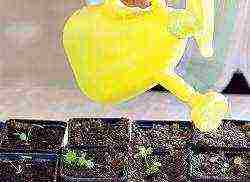 Step 6 |
Carefully water the planted plants with water. |
Growing strawberry seedlings from a mustache
To grow seedlings from a mustache, proceed as follows.
Step 1. Find a powerful formed whisker of an adult plant.
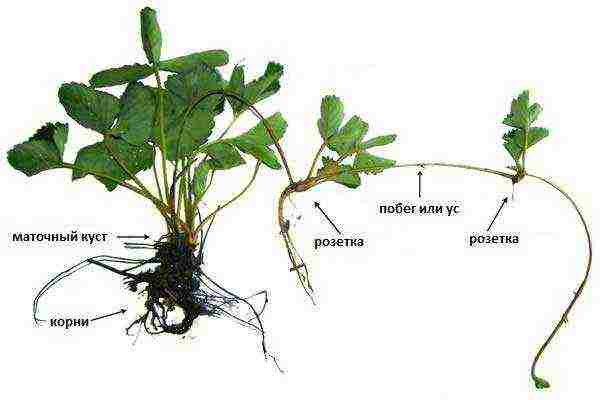
Sockets and mustaches
Step 2. At a distance of 20-25 cm from the mother plant, a hole is dug 5-7 cm deep.
Step 3. Plunge a mustache socket into it.
Step 4. Take a paper clip and slightly unbend it.
Step 5. Press the outlet to the ground with a paper clip (pinned).
Step 6. They fill the hole with soil and slightly compact it.
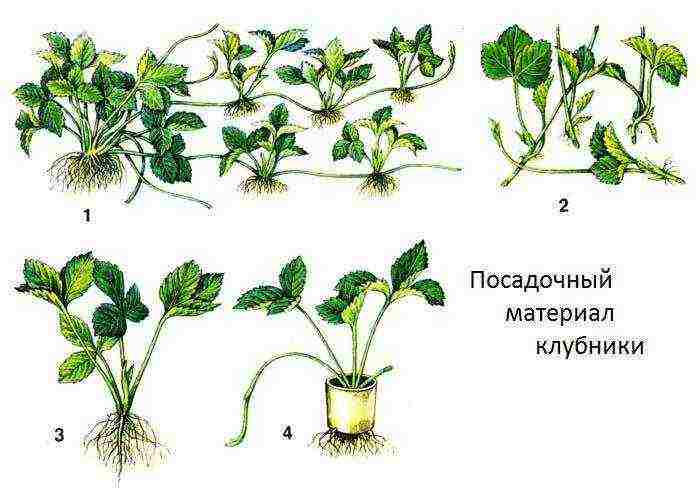
Stages of the formation of strawberry planting material using antennae
Step 7. Cut off the excess part of the mustache that is not associated with the mother plant.
Step 8. Water the outlet.
The technology of horizontal cultivation of strawberries in plastic bags
The least costly technology for growing strawberries involves the use of translucent polyethylene bags (made of white polyethylene). The standard thickness of such bags is 0.2 mm. Dimensions - 16x20 cm. You can buy bags at any household goods store.
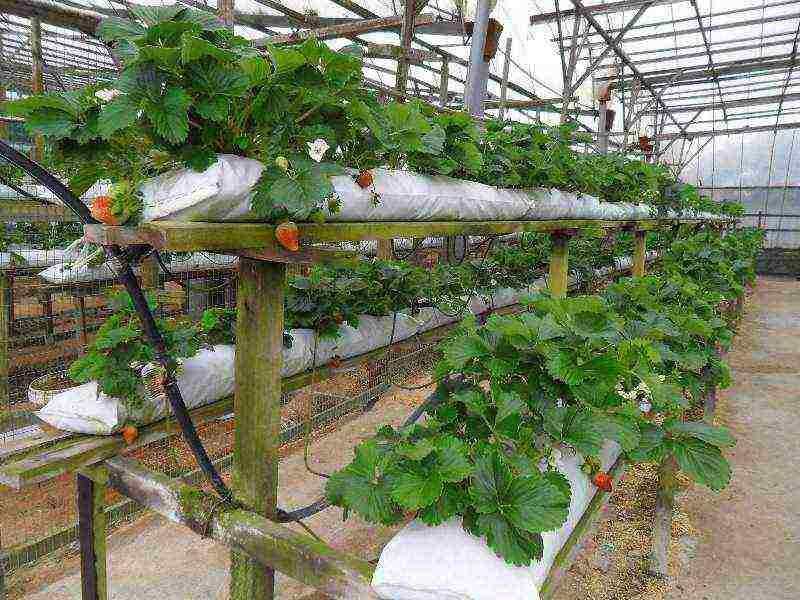
Growing strawberries in bags horizontally
You will also need the following components to prepare the substrate:
- peat (2 parts);
- perlite (1 part);
- sawdust (1.5 parts).
This technology of growing strawberries allows you to start a business with the smallest amount of capital - from 3 to 5 thousand rubles.This will be enough to plant seedlings on an area of 10 m2. From 1 m2, you can get from 15 to 20 kg of berries. When experience in growing strawberries appears, the yield will increase. Professionals receive up to 50 kg / m2. The business can be considered economically viable with a yield of 150 kg from 10 m2.
Bedding bags - an alternative to tall beds
Important! Most of the materials you need to start a business can be free. For example, you will need a dropper to organize watering. These used tubes are in abundance in any medical hospital.
Sequencing
Step 1. Preparation of the substrate: mix sawdust, perlite and peat in a ratio of 1.5: 1: 2.
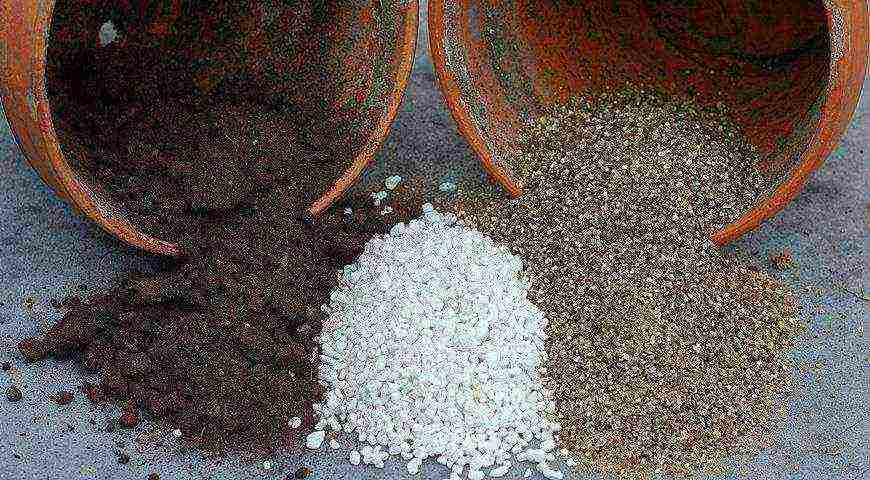
The main properties of perlite are soil loosening and improvement of its structure.
Step 2. Fill plastic bags with the substrate by ¾ of their volume.
Step 3. The top of the bag is sealed with an iron or soldering iron.
Step 4. With any sharp object, cut 2-3 longitudinal holes 7-9 cm long in each bag.
Step 5. Packages with the substrate are laid in even rows on the flooring or the floor so that between the "beds" there is no less than 25 and no more than 30 cm.
Step 6. Each bag is supplied with 3 dropper tubes. One tube is immersed on the bottom layer of the substrate, the second on the middle, the third on the top. Water consumption - 0.5 l / day for 1 package.
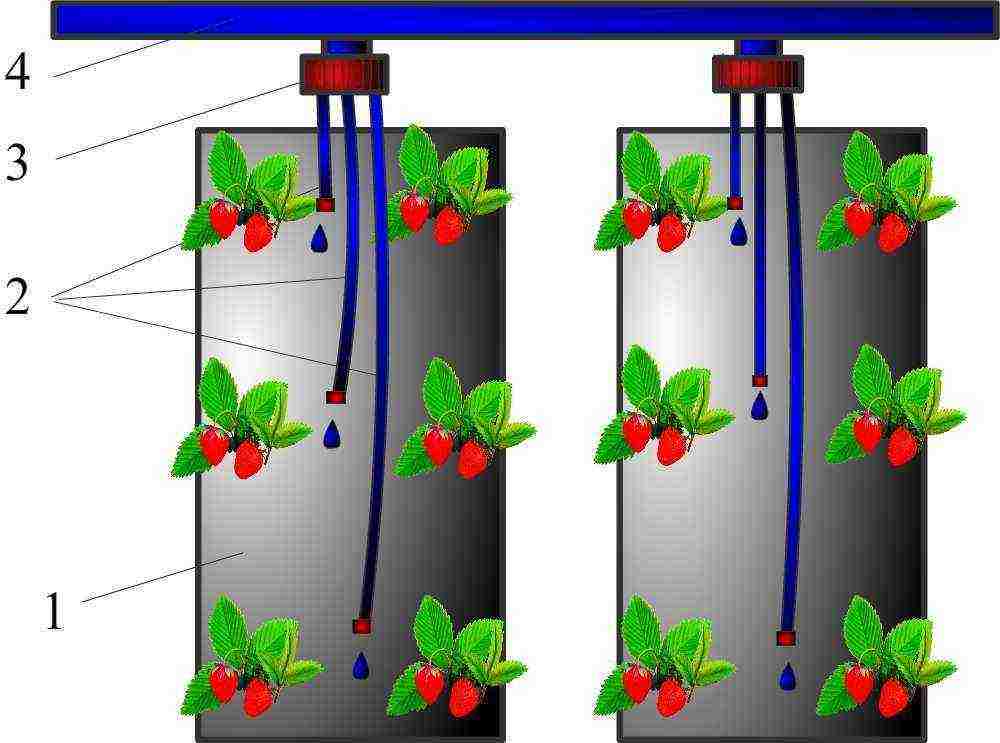
Dripper supply scheme
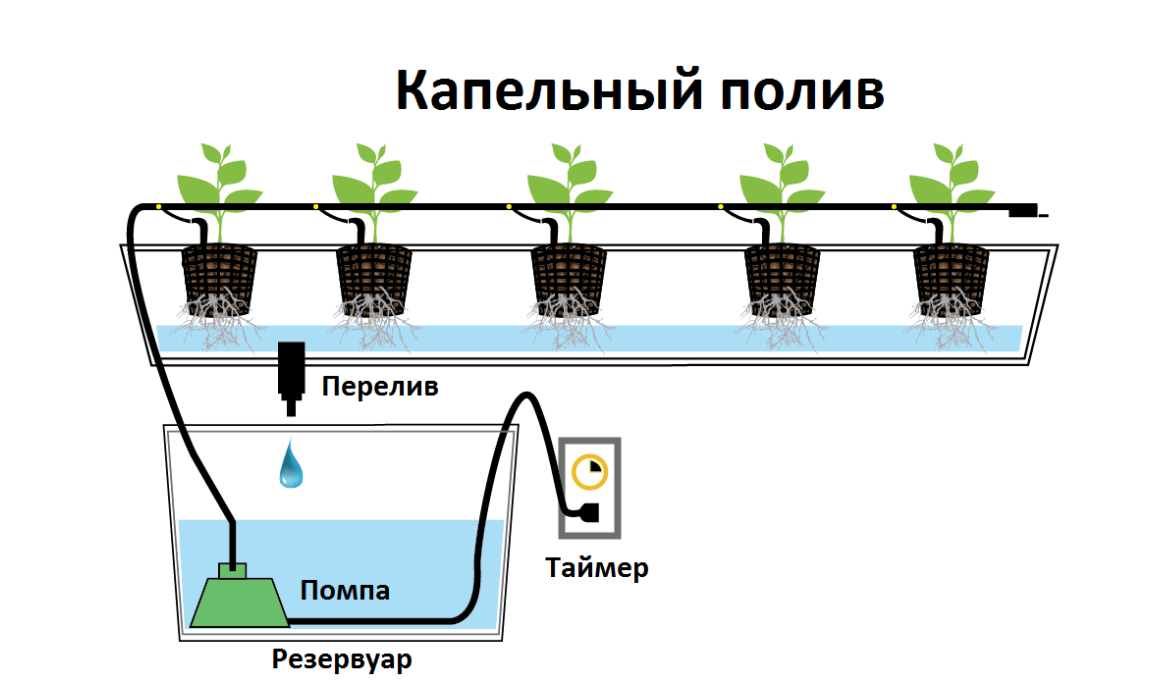
An approximate diagram of a drip irrigation system
Step 7. Seedlings are planted in each slot in the bag.
Step 8. Provide optimal conditions throughout the growth and fruiting period of plants.
At the initial stage of strawberry growth (in the first week after planting the seedlings), it is necessary to maintain a temperature of + 10 ° C in the greenhouse. Further, the indicator is gradually raised to + 20 ° C. During the flowering period, the optimum temperature is from +20 to + 24 ° C.
An important parameter of the microclimate is humidity. It must be kept within 80%, but during the flowering period it must be lowered by 5-10%. When the fruits begin to form, another decrease in humidity by 5-10% will be required.

Growing strawberries in bags
Strawberry growing rules
- Throughout the growth, flowering and fruiting of plants, it is necessary to provide high-quality ventilation of the greenhouse.
- Every 14-15 days, starting from the day of planting seedlings, fertilizers are applied - superphosphate and potassium salt.
- The quality of lighting is extremely important for strawberries. This plant is warm and light-requiring. If the daylight hours lasts at least 16 hours, the berries will form already 35 days after planting the seedlings. If the period of full lighting does not exceed 8 hours, the waiting period for the harvest will be longer (up to 1.5 months). Therefore, if there are not enough sunny days, it is recommended to arrange artificial lighting for the greenhouse.
- If the selected variety is not self-pollinating, it will be necessary to artificially pollinate with a small, soft paintbrush.
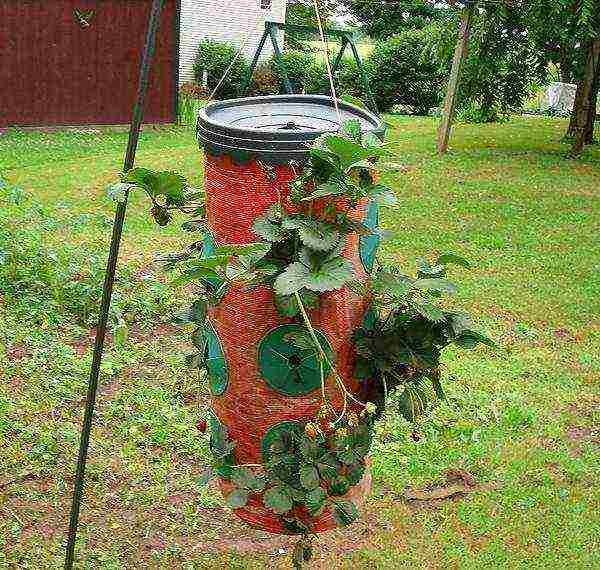
A possible option is the Topsy Turvy Strawberry Planter

Strawberry Planter for growing strawberries
Video - How To Use Topsy Turvy Strawberry Planter
Growing flowers in a greenhouse as a business
Many flower growers often wonder whether or not to turn their hobby into a profitable business. It should be noted that growing flowers in a greenhouse as a business is an interesting and profitable idea, but it has its own characteristics.
Technology for vertical cultivation of strawberries in bags
This method of growing strawberries in a greenhouse is very similar to the previous one. The same requirements are imposed on the care of plants. The same substrate is used as a soil for planting seedlings. But vertical cultivation technology has its advantages.
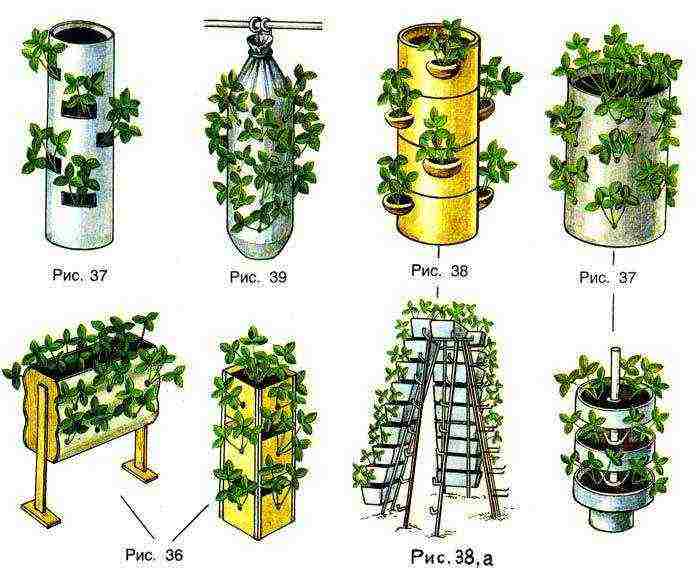
Varieties of vertical strawberry cultivation
Firstly, it allows the most efficient use of the inner space of the greenhouse. Secondly, using this technique, you can get a significantly larger yield.As a container for growing, you can use dense polyethylene bags with a volume of 10 liters or more or plastic pipes with a cross section of 200 and 110 mm.

Growing strawberries in PET bags
The bags are filled with substrate and hung from the top beams of the greenhouse. It is permissible to arrange the bags both in a checkerboard pattern and in even rows. It is important to observe the distance between the suspended containers - it should be at least 40 cm. Optimally - 60 cm.
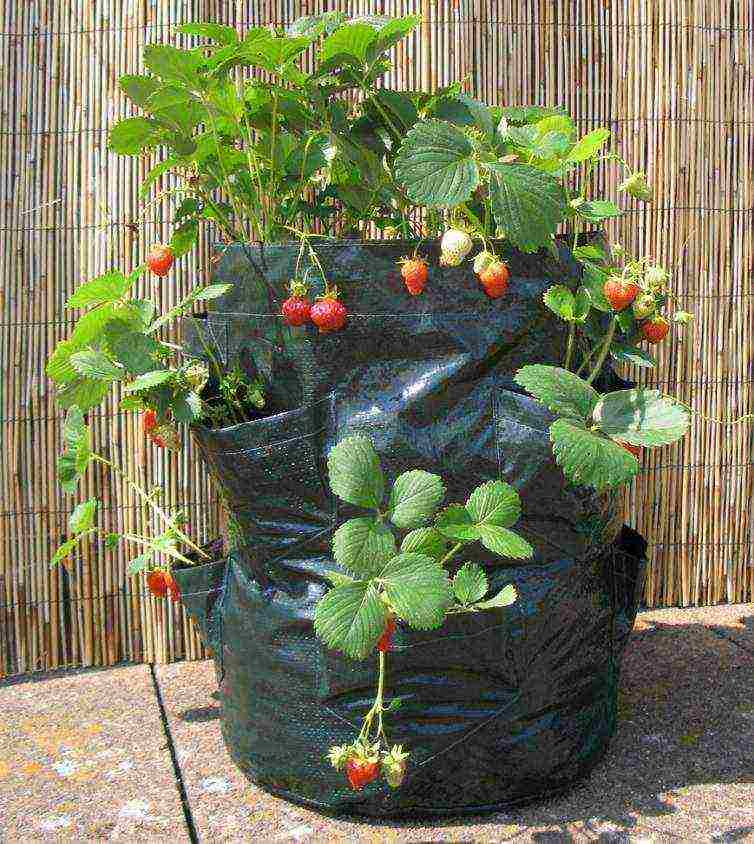
Another option for a bag for growing strawberries
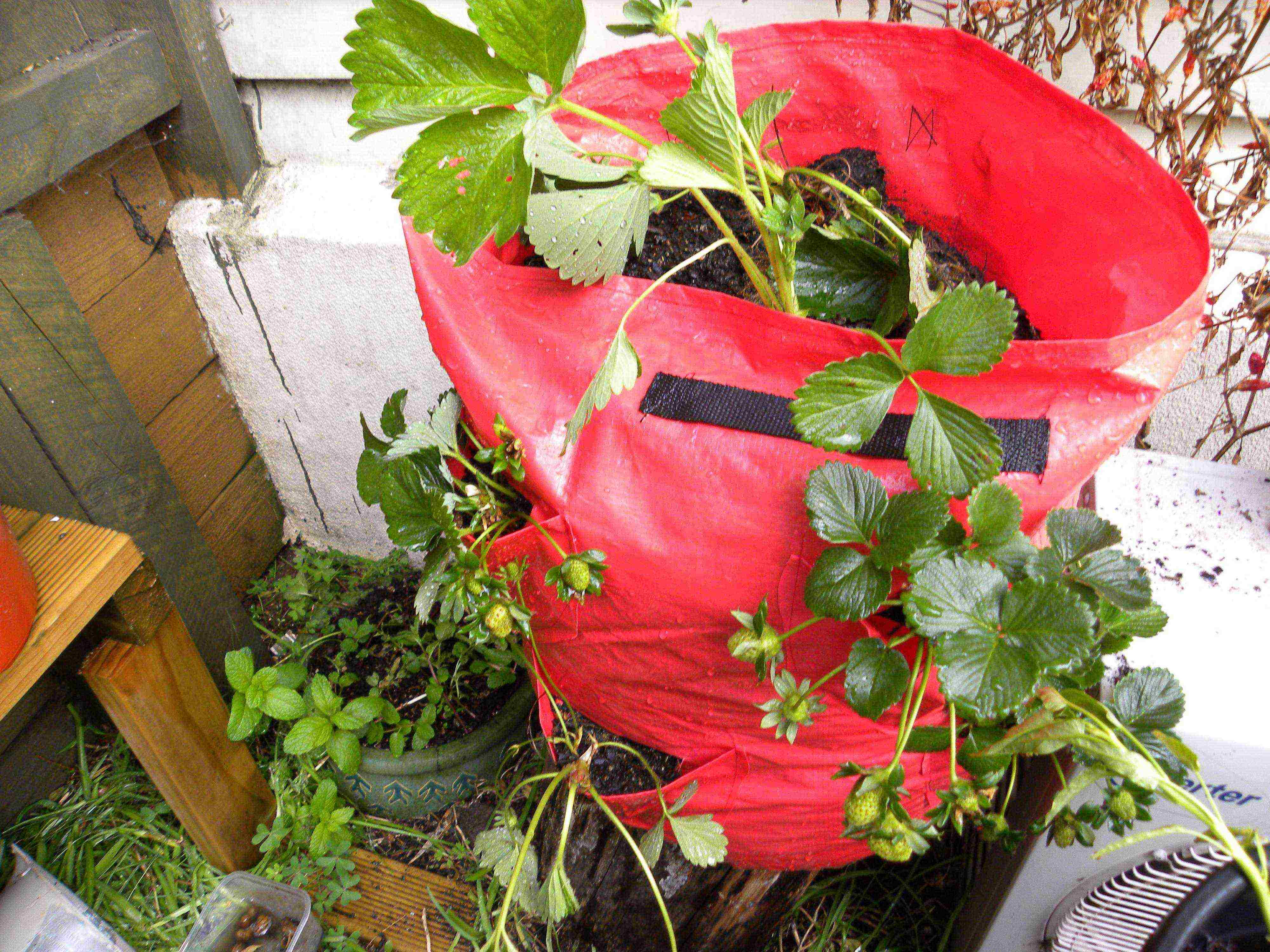
Strawberry bushes in a polyethylene bag
If it is decided to use PVC pipes, proceed as follows.
Step 1. In a pipe with a cross section of 100-110 mm, using a screwdriver and a crown with a diameter of 6 cm, holes are cut so that they are located on the same line and are at a distance of 20-25 cm from each other.
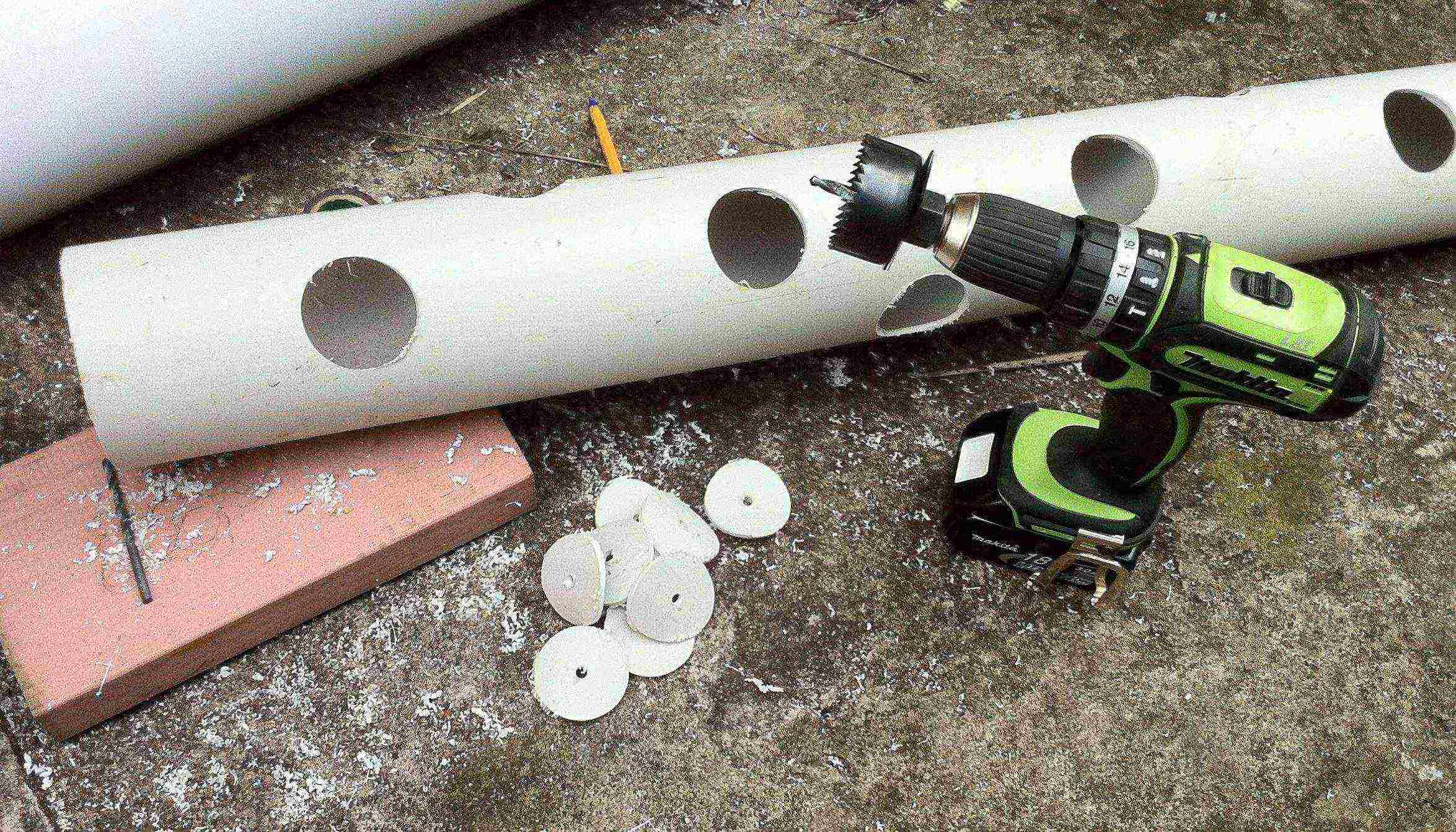
Holes are cut in the pipe
Step 2. A hole is cut in a pipe with a diameter of 200 mm so that only the upper part of the circle is cut. To do this, hold the crown at an angle to the pipe during cutting. By controlling the pressure on the tool, they ensure that the slot is made exactly half of the circle.
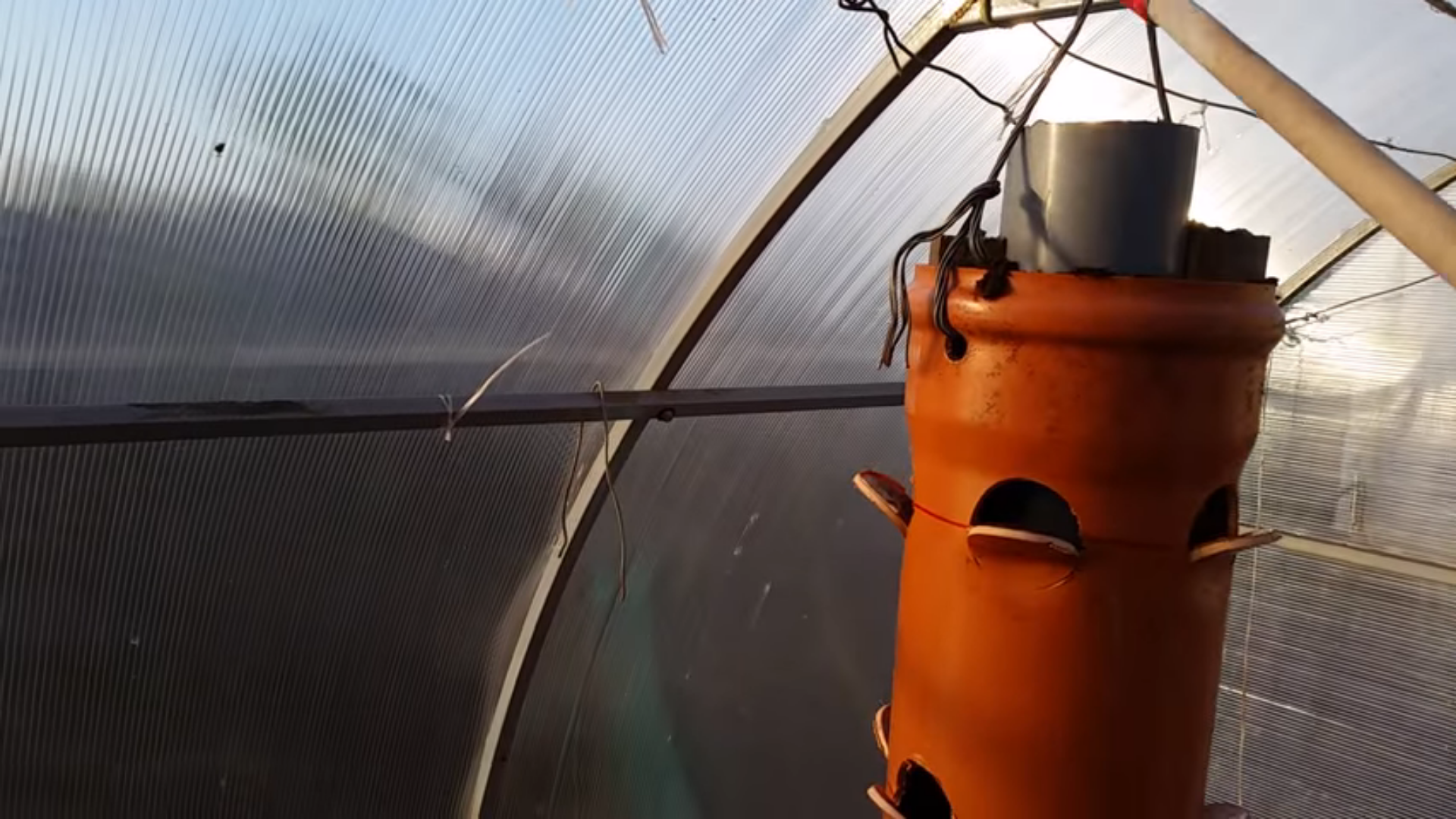
Holes in a pipe with a larger diameter are not cut completely, but so that the cut circles can be bent
Step 3. Fold back the cut parts of the circles in a large pipe, heating them with a construction hairdryer.
Step 4. A pipe with a section of 110 mm is inserted into a pipe with a section of 200 mm.
Step 5. Secure the narrower pipe with wire and wooden blocks so that it is centered.
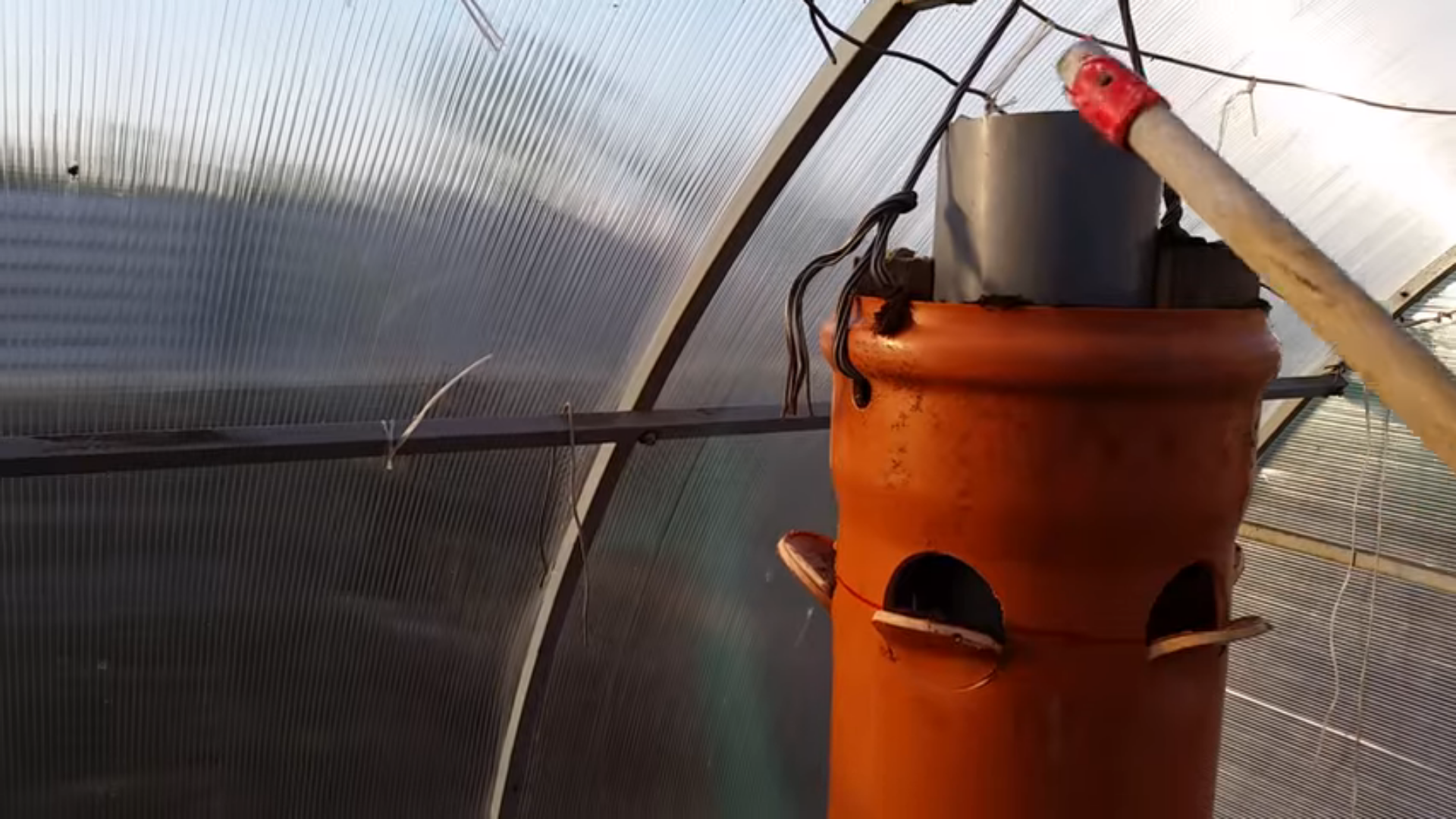
You need to fasten with bars and steel wire as shown in the image
Step 6. Fill the space between the pipes with soil.
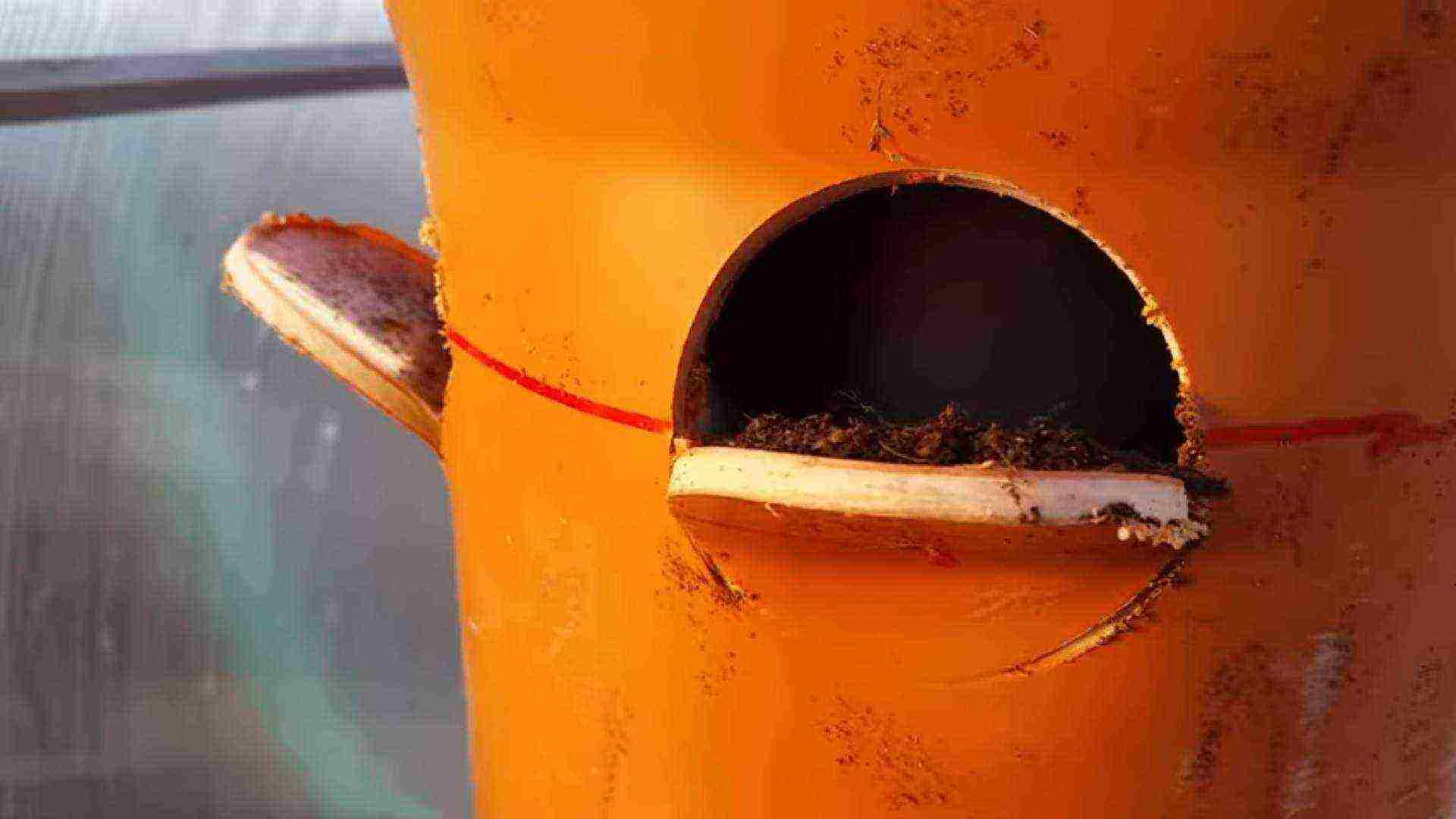
The space between the pipes must be covered with soil.
Step 7. Close the lower end of the narrow pipe with a plug of the appropriate size, in which several holes are pre-drilled to allow excess water to escape.
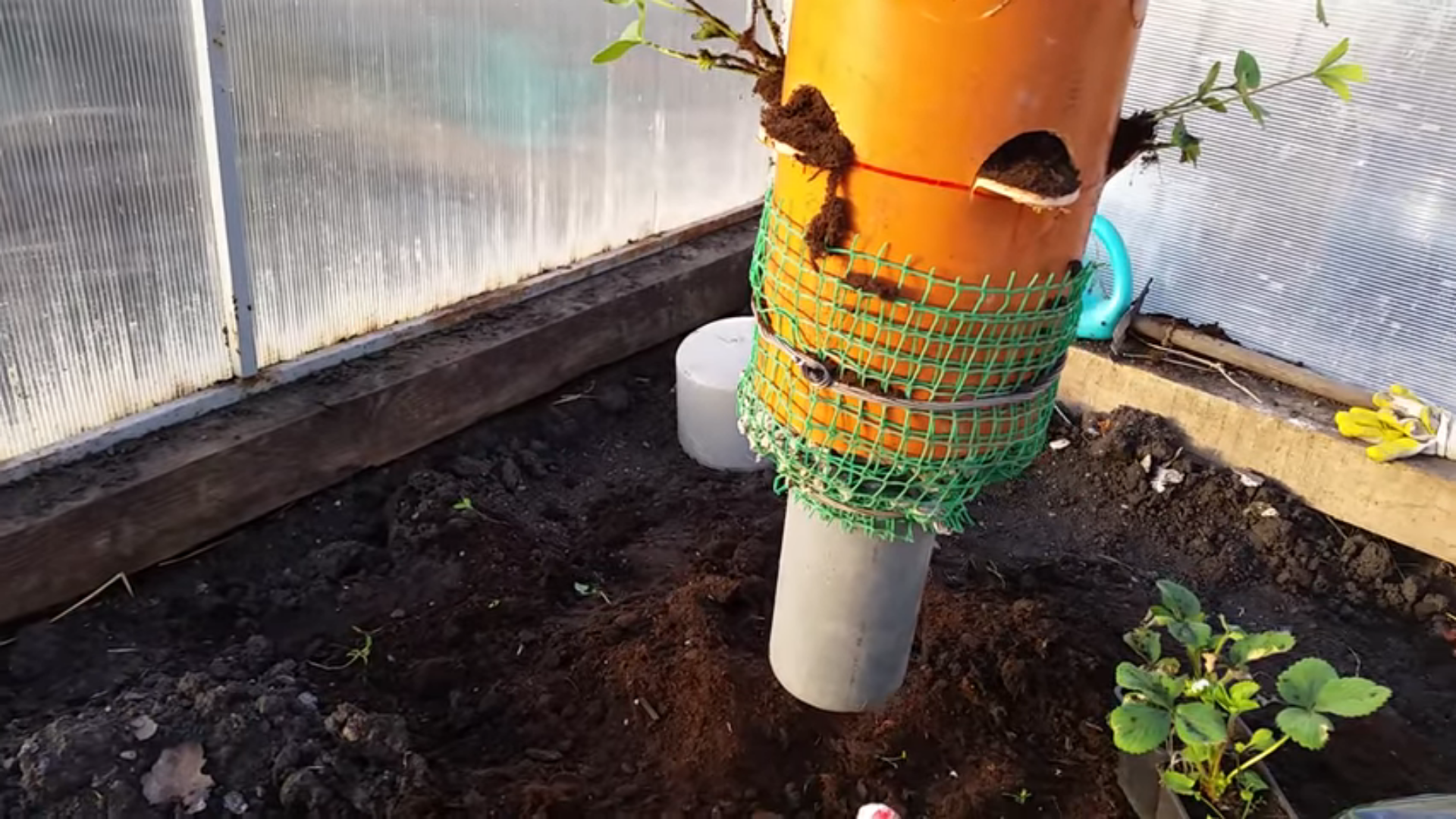
This is what the lower part of the structure will look like.
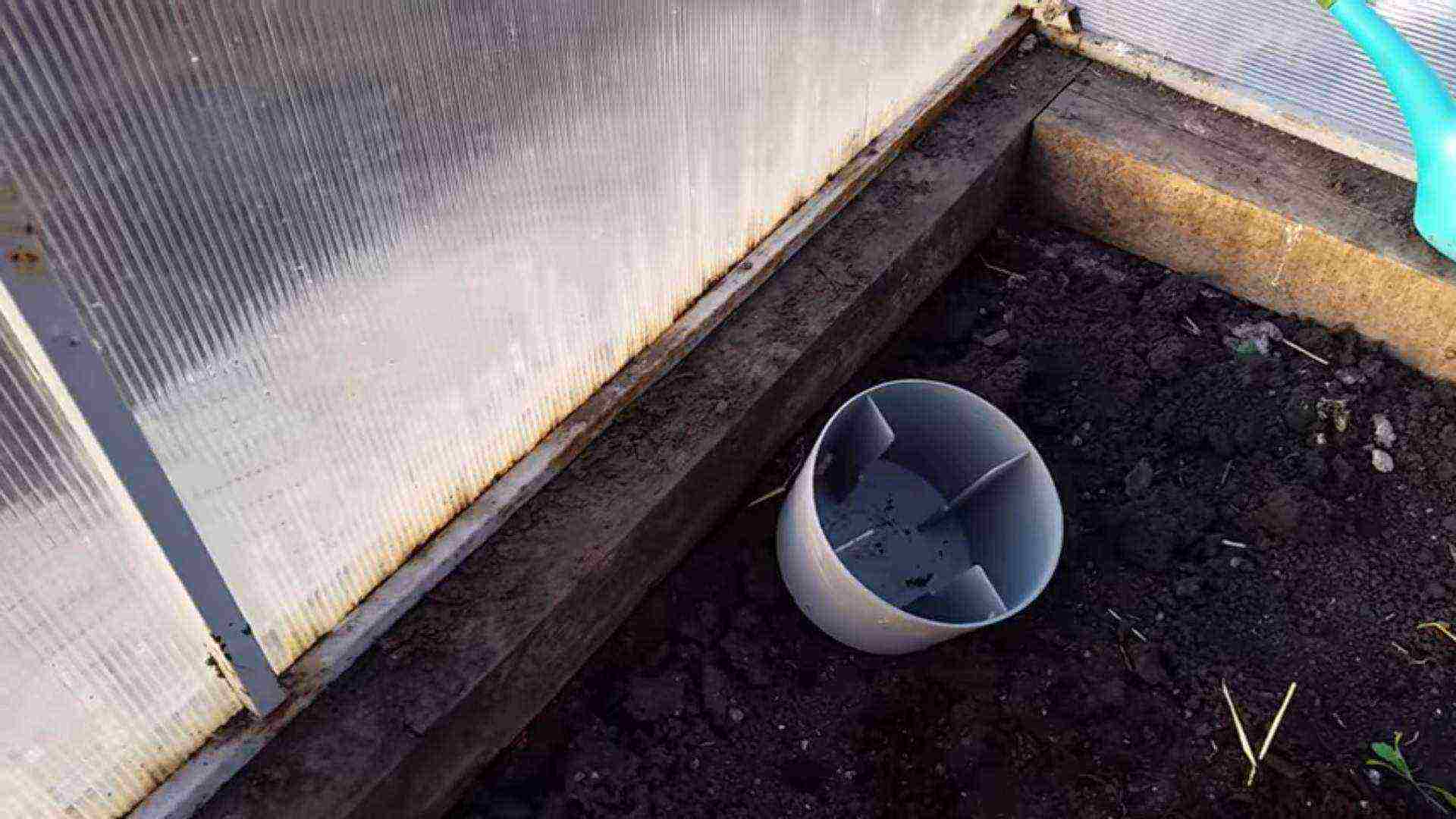
This is a pre-drilled plug needed to cover the lower end of the smaller pipe.
Step 8. The inner space of a narrow pipe is filled with organic matter and plant material - peelings of potatoes and other products, sawdust, branches (you can put earthworms).
Step 9. Strawberry seedlings are planted in the holes of the larger pipe.

Growing strawberries in a PVC pipe vertically
This method is convenient because it does not require regular maintenance. Watering is carried out by pouring water into a narrow pipe 1-2 times a week. The use of pipes is more convenient in that it becomes possible to use the entire available area as efficiently as possible. In addition, pipes are more durable than plastic bags and do not require frequent replacement.
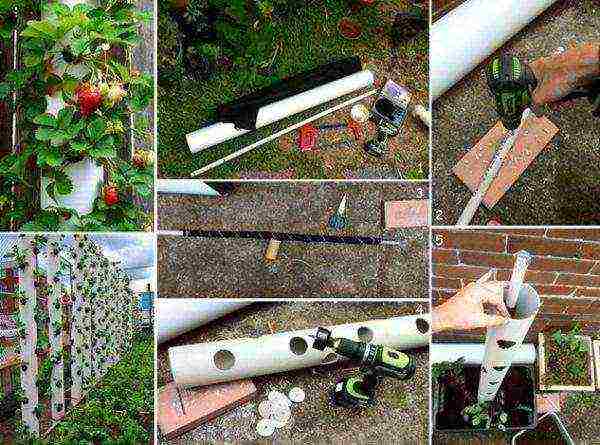
Another option for vertical cultivation of strawberries in a tube

Another original option is a strawberry pyramid
Video - Vertical breast in a greenhouse. Strawberries in a tube
Video - Growing strawberries in a greenhouse
